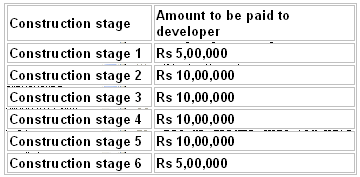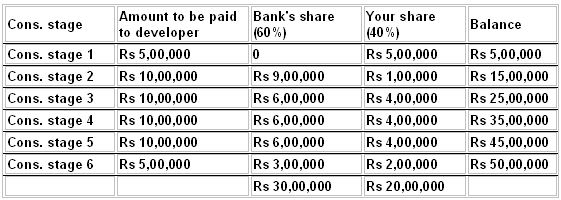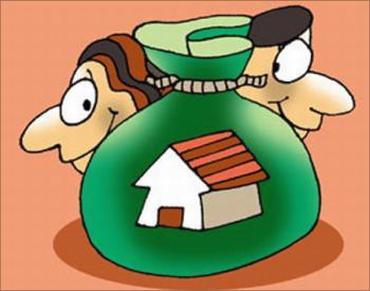Anil Gupta, am22tech.com
Margin percentage is a concept which is quite prevalent in home loan cases and the loan borrower is normally not aware of it until he has availed the loan. Nobody in the bank sales team will explain you the concept as it may confuse their prospective client which is you. We, as loan borrowers never try to find out the intrinsic details while applying for loan as we are in hurry but find certain policies strange and betrayal by bank when we actually encounter them.
One of them is margin percentage and I myself have learned this term when I went to bank to get the disbursement of loan and was taught the lesson of this concept. Here is the explanation of what it is and how it affects you as a loan borrower:
Let's understand the whole thing with an example.
Storyline:
Property cost: Rs 50 lakh
Your contribution: Rs 20 lakh
Home loan: Rs 30 lakh
You apply for loan and get the approval done from bank. You payment plan to builder/developer is contruction linked plan, that is, you have to make payments on the basis of construction stage and this plan is shared with you by builder in advance.
Courtesy: Am22tech.com
Home buyers, here's why banks can STOP your loan
Photographs: Rediff Archives
What is margin percentage?
If you take a closer look at your home loan documents, you will find this margin money percentage clearly written on it. In our example it is calculated as follows:
Margin percentage = (Your contribution in total value of property) / (Total value of property) * 100
Margin percentage = 20,00,000 / 50,00,000 * 100
Margin percentage = 40 per cent
Home buyers, here's why banks can STOP your loan
Let's assume that you have the construction-linked plan as shown in the table below:
Let us assume that you have already paid Rs 5 lakh (contruction stage 1) amount to the developer and now have taken loan of Rs 30 lakh from bank with the condition that you will pay remaining Rs 15 lakh from your own sources. Now, whenever we have this situation, we as normal human beings think that the bank will pay the amount demanded out of Rs 30 lakh to builder as and when they demand and we will collect rest Rs 15 lakh from some sources that we have to pay in contruction stage 5 and 6.
As the normal construction time of a property is 36 months, we assume that we have sufficient time to collect that money and we are bound to make payments at the time of possession of property.
This is the biggest misconception and gets clarified only when the home loan disbursement is actually made by bank. Nobody from bank sales team will ever tell you the fact that you need to make payments of your portion, that is, margin money or margin percentage as and when bank makes a payment to builder.

Home buyers, here's why banks can STOP your loan
Banks always maintain their position in making disbursements to the builder in the sense that they will never pay more than their margin percentage in the total value of the property at any given point in the construction stage.
In our example, your margin percentage is 40 per cent and bank will contribute rest 60 per cent. This means that whenever bank will disburse an amount to developer, it will always maintain this percentage and will never let its own portion grow more than 60 per cent. So, when you actually go to bank demanding to pay the 'constructoin stage 2' payment, that is, Rs 10 lakh, bank will evaluate the situation as follows:
Your contribution in property after this payment = Rs 5 lakh i.e. 33.33 per cent of total payment made to developer (5,00,000/15,00,000 *100)
Bank's contribution in property after this payment = Rs 10 lakh i.e. 66.66 per cent of total payment made to developer (10,00,000/15,00,000 *100).
Home buyers, here's why banks can STOP your loan
Now, as per the home loan agreement, margin money percentages are 40 per cent and 60 per cent for you and bank which is violated if bank pays the full Rs 10 lakh in this payment. You can clearly see that your portion reduces to 33.33 per cent and bank's increases to 66.66 per cent.
So, in this situation, bank will never make the full payment of Rs 10 lakh to the builder. Instead it will ask you to pool in the amount in Rs 10 lakh cheque which will help maintain the margin percentages. i.e. Rs 1 lakh.
So, if you pool in Rs 1 lakh and bank pays Rs 9 lakh in this payment to developer, the final scenario looks like this:
Your contribution in property after this payment = Rs 6 lakh i.e. 40 per cent of total payment made to developer (6,00,000/15,00,000 *100)
Bank's contribution in property after this payment = Rs 9 lakh i.e. 60 per cent of total payment made to developer (9,00,000/15,00,000 *100).
Hence, this satisfies the MARGIN percentages as laid down in the home loan agreement.
Home buyers, here's why banks can STOP your loan
So, every time, bank makes a disbursement according to demand by developer, bank will apply the same logic and ask you to pool in money if the margin money percentages are breached. The subsequent payments would like as shown in the table below:
It is important to understand the above concept and plan accordingly else you might find yourself in a surprise when bank will not disburse the loan payment even though the loan is santioned and everything looks fine.
Why do bank ask you to maintain margin percentage?
The main reason for doing this is that banks do not want to pay more than what they have sanctioned as per home loan agreement at any given point in the construction stage of property. The situation is different if you buy a ready to move in property in which case bank's make one time payment to developer/seller.
In this case, you would have also paid the margin percentage money in one go itself i.e. at the time of buying the property.
There is an element of risk involved in financing under construction properties that it may not get completed on time or developer may default or any other unforseen circumstances. Bank always wants to make sure that you have invested sufficiently in the property as per the commitment in home loan agreement.








Comment
article